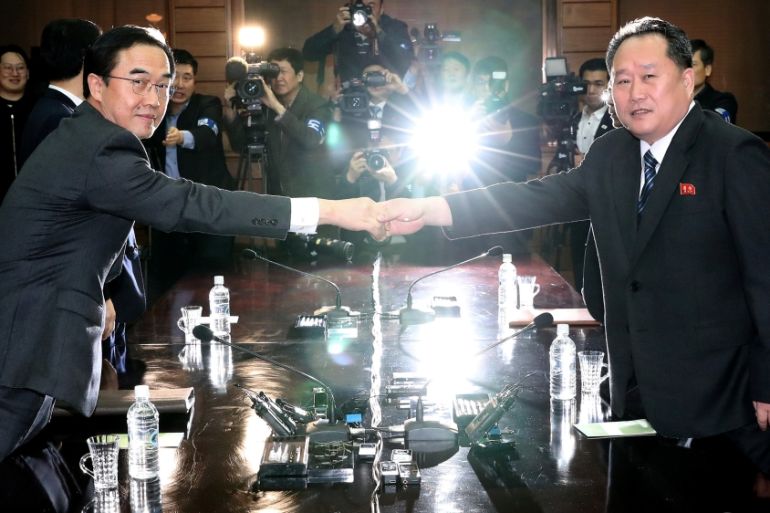Date set for first inter-Korean summit since 2007
Officials from both sides of the border agree on April 27 as date for high-level talks after meeting in Panmunjom.

North and South Korea have agreed to hold the first inter-Korean summit since 2007 on April 27, South Korean government officials say after holding high-level talks with their North Korean counterparts.
The announcement on Thursday followed preparatory talks in the border village of Panmunjom inside the Demilitarised Zone.
The South Korean delegation was led by Cho Myoung-gyon, the unification minister, while Ri Son-gwon, chairman of an agency that deals with inter-Korean affairs, headed the team of officials from North Korea.
The summit – only the third to take place since the 1950-1953 Korean War – is scheduled to be attended by North Korean leader Kim Jong-un and South Korean President Moon Jae-in.
According to Yonhap news agency, the pair will meet in the Peace House on the southern side of Panmunjon.
The summit is expected to prove significant in the global diplomatic push to resolve the standoff over the North’s nuclear programme.
Artists from both countries will collaborate for a show on April 3, the South’s Yonhap news agency said.
The talks will precede musical performances in Pyongyang in early April by a group of South Korean singers.
The two sides will hold another preparatory meeting on April 4 to discuss protocol, security and media coverage issues.
Al Jazeera’s Kathy Novak, reporting from Seoul, said the announcement is “really quite a win-win situation for the South Korean president”.
“This is a sharp turnaround from where things were at the end of last year,” she said.
“Back then, the two countries technically were at war. Then the meetings followed in the lead-up to the Winter Olympics. It’s quite a win-win situation for the South Korea president and now he’s getting what he wished for.”
‘With goodwill’
Against this backdrop, South Korea’s presidential office said a Chinese official was heading to Seoul to brief President Moon about the summit this week between North Korea’s and China’s leaders.
The two-day trip by Yang Jiechi, Chinese state councilor, follows talks earlier this week between Kim Jong-un and Xi Jinping.
On Wednesday, Chinese news agency Xinhua quoted Kim as saying the nuclear weapons issue could be resolved if South Korea and the US respond to North Korea’s efforts “with goodwill”.
“It is our consistent stand to be committed to denuclearisation on the peninsula, in accordance with the will of late President Kim Il-sung and late general secretary Kim Jong-il,” Kim said, referring to his grandfather and father, according to the statement by China’s foreign ministry.
“The issue of denuclearisation of the Korean Peninsula can be resolved if South Korea and the United States respond to our efforts with goodwill, create an atmosphere of peace and stability, while taking progressive and synchronous measures for the realisation of peace.”
|
|
A summit between North Korea’s Kim and US President Donald Trump is also expected to take place by the end of May.
The fast-thawing relations between the two countries, just months after the North Korean leader boasted of having a nuclear button on his desk, started in January when cross-border talks took place before the 2018 Winter Olympics.
The Pyeongchang Games saw athletes from both sides of the border march under a unified flag at the opening ceremony of the event, which also saw a joint female ice hockey team.
North Korea’s willingness to hold talks has been welcomed by most South Koreans, albeit with scepticism over Kim’s sincerity in abandoning his nuclear arsenal through dialogue, according to a recent poll.
A survey conducted by RealMeter in South Korea on Monday said 73.1 percent of respondents welcomed North Korea’s proposal for dialogue and willingness for denuclearisation.
However, 64.1 percent of respondents said they did not trust North Korea’s intentions.
Those in their 20s were the most critical, with 74 percent expressing distrust in the regime.